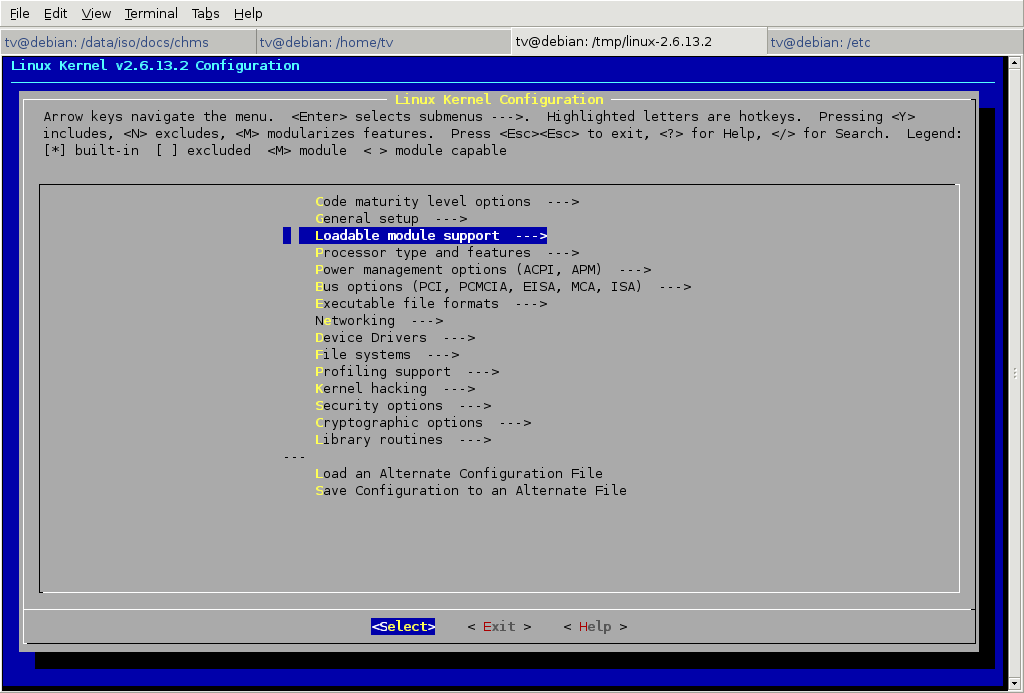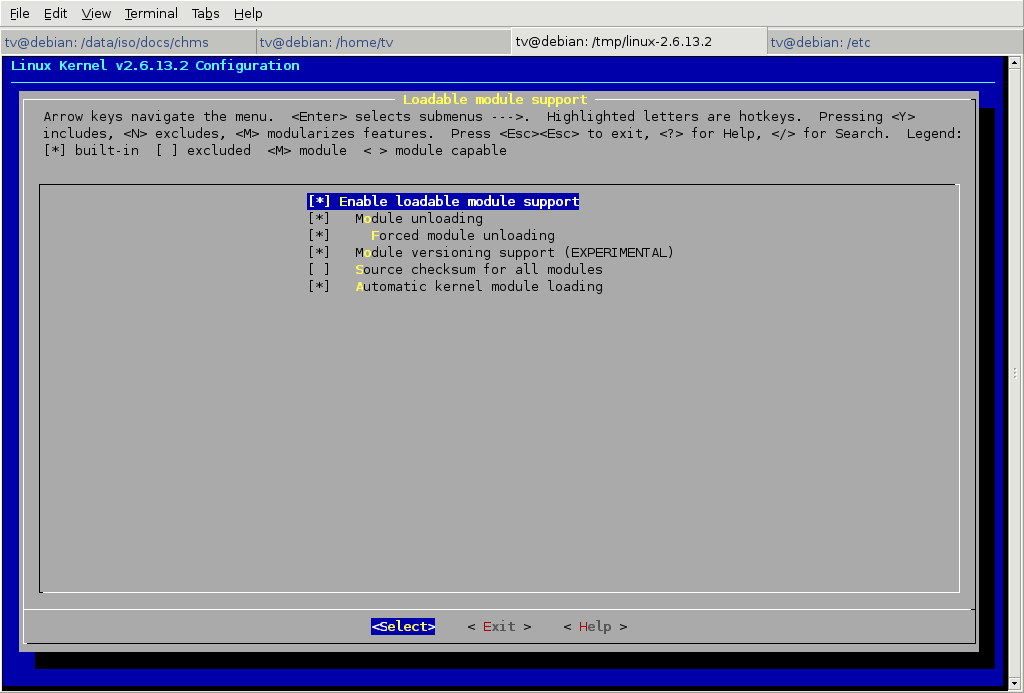Your Linux kernel compiled and always installed in /boot directory:
To list of all installed kernel in your system, enter:
$ ls -l /boot/
Outputs:
-rw-r--r-- 1 root root 106172 Mar 23 03:07 config-2.6.32-5-amd64 -rw-r--r-- 1 root root 130657 Feb 11 15:14 config-3.2.0-0.bpo.1-amd64 drwxr-xr-x 3 root root 4096 Mar 28 19:21 grub -rw-r--r-- 1 root root 10332764 Mar 28 19:21 initrd.img-2.6.32-5-amd64 -rw-r--r-- 1 root root 11650089 Feb 26 03:50 initrd.img-3.2.0-0.bpo.1-amd64 drwxr-xr-x 2 root root 12288 Jan 11 03:19 lost+found -rw-r--r-- 1 root root 165084 Oct 21 2010 memtest86+.bin -rw-r--r-- 1 root root 167264 Oct 21 2010 memtest86+_multiboot.bin -rw-r--r-- 1 root root 1665393 Mar 23 03:07 System.map-2.6.32-5-amd64 -rw-r--r-- 1 root root 1992422 Feb 11 15:14 System.map-3.2.0-0.bpo.1-amd64 -rw-r--r-- 1 root root 2424256 Mar 23 02:58 vmlinuz-2.6.32-5-amd64 -rw-r--r-- 1 root root 2813456 Feb 11 15:11 vmlinuz-3.2.0-0.bpo.1-amd64
Where,
- config-3.2.0-0.bpo.1-amd64 –> Kernel configuration file generated by make menuconfig/make xconfig/make gconfig.
- System.map-3.2.0-0.bpo.1-amd64 –> This file has a map of positions of symbols in the kernel. Device driver such as USB pen uses hot plug, which depend upon symbols generated by depmod utility.
- vmlinuz-3.2.0-0.bpo.1-amd64 — > Your kernel file.
- initrd.img-3.2.0-0.bpo.1-amd64 –> Contains device drivers which are required to boot and load rest of operating system from disk. Usually SCSI,IDE, software RAID drivers are stored in this file.
- grub –> It is a directory, which stores grub Boot loader configuration file.
You may also find the following files:
- config –> Soft link to current kernel configuration file
- vmlinuz -> Soft link to current running kernel file
- System.map –> Soft link to current running kernel system map file
Please note that 3.2.0-0.bpo.1-amd64 is kernel version.
Task: Find out version of running Linux kernel
Use any one of the following command:
uname -r
OR
cat /proc/version
Outputs:
Linux version 3.2.0-0.bpo.1-amd64 (Debian 3.2.4-1~bpo60+1) ([email protected]) (gcc version 4.4.5 (Debian 4.4.5-8) ) #1 SMP Sat Feb 11 08:41:32 UTC 2012
Task: Find out where running kernel modules (device drivers) are stored
Use any one of the following command:
ls -l /lib/modules/$(uname -r)
OR
ls -d /lib/modules/$(uname -r)
For 64 bit system, use /lib64 directory:
ls -l /lib64/modules/$(uname -r)
Outputs:
total 2864 lrwxrwxrwx 1 root root 42 Feb 26 03:50 build -> /usr/src/linux-headers-3.2.0-0.bpo.1-amd64 drwxr-xr-x 10 root root 4096 Feb 26 03:49 kernel -rw-r--r-- 1 root root 671461 Feb 26 03:54 modules.alias -rw-r--r-- 1 root root 656721 Feb 26 03:54 modules.alias.bin -rw-r--r-- 1 root root 2732 Feb 11 15:11 modules.builtin -rw-r--r-- 1 root root 3701 Feb 26 03:54 modules.builtin.bin -rw-r--r-- 1 root root 328629 Feb 26 03:54 modules.dep -rw-r--r-- 1 root root 454611 Feb 26 03:54 modules.dep.bin -rw-r--r-- 1 root root 325 Feb 26 03:54 modules.devname -rw-r--r-- 1 root root 108688 Feb 11 15:11 modules.order -rw-r--r-- 1 root root 131 Feb 26 03:54 modules.softdep -rw-r--r-- 1 root root 286127 Feb 26 03:54 modules.symbols -rw-r--r-- 1 root root 362552 Feb 26 03:54 modules.symbols.bin lrwxrwxrwx 1 root root 43 Feb 26 03:50 source -> /usr/src/linux-headers-3.2.0-0.bpo.1-common drwxr-xr-x 3 root root 4096 Feb 26 03:50 updates
How do I load kernel modules at boot time?
/etc/modules file contain the names of kernel modules that are to be loaded at boot time, one per line. Lines beginning with “#” are ignored.Parameters can be specified after the module name
$ cat /etc/modules
Sample outputs:
# /etc/modules: kernel modules to load at boot time. # # This file contains the names of kernel modules that should be loaded # at boot time, one per line. Lines beginning with "#" are ignored. # Parameters can be specified after the module name. firewire-sbp2 loop
However, modern Linux distribution uses the following location or configuration directory/file for modprobe kernel device driver:
- /etc/modprobe.conf file
- /etc/modprobe.d/ directory
How do I install latest kernel version?
Find out if latest version available or not via following command:
apt-cache search kernel-image| grep VERSION
An example to see if 2.6.xx.xx series new kernel available or not (Debian Linux):
apt-cache search kernel-image| grep 2.6
Compare version with existing running kernel if it is greater than running kernel, run following command to install new kernel (run it as a root user and assuming that 2.6.12.1 is latest the kernel available):
apt-get install linux-image-2.6.12-1-386
Difference between Monolithic and Modular kernel:
Monolithic kernel
- Single binary file [ directory ls -d /lib/modules/$(uname -r) does NOT exists ]
- All drivers included in kernel itself
Modular kernel
- Multiple files for kernel
- Drivers can be loaded or unloaded into kernel using modprob command, see man page of
lsmod, modprob etc [directory ls -d /lib/modules/$(uname -r) exists to store drivers] - Almost all drivers are build and linked against kernel
How do I build modular kernel?
You can built modular kernel by setting option in kernel configuration option:
Enable loadable module support (CONFIG_MODULES) [Y/n/?]
If you set above option to Y then kernel becomes modular and three possibilities occurs for each and every feature/driver:
- m – you can compile driver as module
- y – built into kernel itself
- n – Don’t include feature/driver
Type the command make menuconfig:
make menuconfig
1) Select Loadable module support and press enter/return key:

Loadable module support
2) Select Enable Loadable module support option and other options, see following figure:

Enable Loadable module support
For more information see the followin links:
* Compiling Linux kernel 2.6
* Text books :
| This book covers Memory management including file buffering, process swapping, and Direct memory Access (DMA), The Virtual Filesystem and the Second Extended Filesystem, Process creation and scheduling, Signals, interrupts, and the essential interfaces to device drivers, Timing, Interprocess Communication (IPC), Program execution etc. A must read to master kernel concepts | If you wants starting hacking kernel then this perfect book for you. This book can be also use with your CS (college course) to get more indepth information on operating systems – it helps gain a better idea of kernel conepts. Try following book: |
